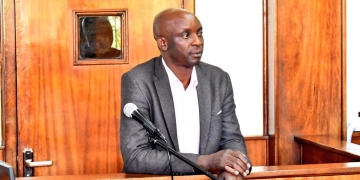KAMPALA, UGANDA — Uganda’s Judiciary has introduced the Small Claims Procedure at Kawempe Chief Magistrates Court, an initiative aimed at improving justice delivery for citizens.
The Small Claims Procedure (SCP) offers a streamlined process for resolving civil disputes involving amounts not exceeding 10 million Ugandan Shillings (about $2,600).
Judiciary Urges Businesses to Embrace New Procedure
During the launch ceremony Thursday at the Kawempe Chief Magistrates Court, Justice Geoffrey Kiryabwire, chairperson of the Small Claims Procedure implementation committee, urged local business owners to embrace the initiative. He highlighted its affordability and quicker resolution times compared to traditional legal methods.
“Like on my side, I am a poor man who doesn’t want to lose any coin. If I demand you my money and you fail to pay, I will turn to Small Claims Procedure to recover the money, not the other system which involves imprisonment as a punishment,” Kiryabwire said.
He noted that Kawempe, a developing business hub, needs a system to ensure business people are not cheated, which directly impacts community and national development. “We can’t develop when we still have unresolved financial disputes among ourselves,” he added.
Kiryabwire also stressed the inefficiency of taking locally resolvable cases to police and then court, contributing to case backlogs.
“We are going to train religious and political leaders to support community members in resolving cases involving financial transactions below 10 million shillings,” he said. “The leaders must always advise the people to resolve their civil matters through negotiations before engaging police and courts of law.”
Local Leaders Applaud Initiative
Hajji Noor Njuki, the Deputy Resident City Commissioner (RCC) of Kawempe, lauded the Judiciary for bringing justice closer to the community. He noted it saves residents from traveling long distances to pursue their cases.
“We are so grateful for the Chief Magistrate of this court; she has been vibrant in engaging and sensitizing the community members about how the justice system works,” Njuki remarked. He encouraged local council leaders to spread awareness about Small Claims Procedure through regular village meetings.
Her Worship Zulaika Nanteza, the Judiciary’s Registrar in charge of Alternative Dispute Resolution (ADR), commended the large public turnout at the launch. She described SCP as a Judiciary initiative designed to provide timely justice to Ugandans.
“If you go to court, even if you don’t understand English, always ask the judicial officer or the clerk what has transpired and what will be required in the next sitting,” Nanteza advised. She highlighted how a lack of understanding can lead to unnecessary case adjournments.
Early Successes Reported
Her Worship Roseline Nsenge, the Kawempe Court Chief Magistrate, revealed that the five-month-old court had already successfully handled a significant number of small claims cases before the official launch.
“This court commenced its operations in January 2025. The registrars told us that even though you’re babies, you can start small claims. We agreed, so far we have had 98 registered cases, out of which 45 have been settled, 27 cases were opened officially without demand notices and 10 of these have been already solved,” Nsenge stated.
She also noted that Kawempe Court has trained local council leaders within its jurisdiction on various Alternative Dispute Resolution mechanisms, including mediation. She believes more people will embrace these initiatives for timely justice.
The event drew attendees from the Judiciary, local leadership, lawyers, civil society organizations, academia, and representatives from the Uganda Police and Uganda Prisons, alongside the general public.
Understanding the Small Claims Procedure
Small claims are handled in Chief Magistrate’s Courts within the local limits where the cause of action originated or where the defendant resides.
Before filing a claim, the claimant must issue a written demand notice to the intended defendant, allowing 14 days for settlement. If the dispute remains unresolved after this period, the claimant can file a claim form with the court, attaching the notice of demand, proof of service, and any relevant documentation.
The court then schedules a hearing where both parties present their case. The judicial officer delivers a judgment either immediately or within 14 days of the hearing. Lawyers are not required under this initiative, making it a more cost-effective option.



















